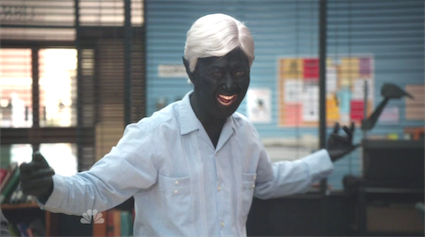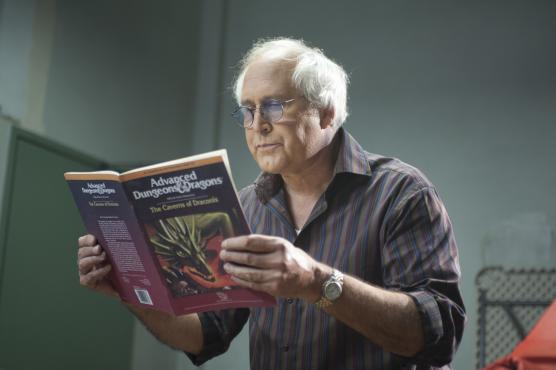Those who know me personally, know that I am one of the "old guard" - that I've been playing games of Dungeons & Dragons since I was 15 (I started in 1977) and have run games (and sometimes played) every edition of the "beautiful" game. When 4th came out, I reacted badly - much more so than when 3rd came out (though I now prefer 4e).
A good friend of mine was suprised at my recent blogs, wondering why I was SUDDENLY warming to WizBro!
HOWEVER I'm not really Warming to Wizards per-se, mainly because they've made some serious "errors" with their business model. OK, they have shareholders etc - but they have to remember the fan base for an RPG is a LOT different to the fan base of say a Card Game (and a lot more vocal).
I didn't (and still don't) like their original marketing approach to D&D. Whilst the system itself is playable, they didn't really explain (and therefore justify) their "approach" to the new edition.
There was lots of "babbling" about the "sweet spot" when it comes to playing D&D, but no real explanation (that I could find) as to the reasoning behind their sweeping changes.
All that was further compounded with their "dismissive" attitude to thier fan-base, resulted in the "knee jerk" reaction that I myself was guilty of.
HOWEVER, if you read through the rules (especially the "essentials" range - its very apparent what they intended).
Here are my own thoughts on the whole debacle -
Choice and Playability - Although the familiar character types are present. They didn't want everybody to be the same. So there are a LOT of choices, that in itself alienated the 1st/2nd Ed crowd. HOWEVER the choices in 4e are more "class driven" (though you can "cross class" Traits/Powers/Skills - its their way of multi-classing), this class-driven choice system with no real multi-classing in turn alienated the 3.X crowd. It is less complex to create a character than in 3.X D&D - and the 4e "Archetypes" are stronger.
They increased starting Hit Points, a lot of DM's/Players out there started games/campaigns at higher than first level. The increased HP at first level negates the need for this (although I prefer a Die Roll + Con Bonus at each level rather than a static amount myself, ad that is easily house ruled).
They also introduced "healing surges", an abstract concept that allows PC's to regain Hit Points "X" amounts of times a day - receiving healing magic also "burns off" a healing surge. This concept PI**ED OFF so many Fans its untrue, but I get the feeling these "fans" didn't understand the concept of Hit Points in the first place.
You don't suddenly get physically "tougher" as you rise in level, but rather Hit Points represent Training and Fighting Stamina - so Warriors get more and Wizards get less (see, logical). A "healing surge" would have been better described as a "second wind" pretty much representing an individuals ability to regain their composure, tapping into their hidden reserves.
In reality all it means is that you can throw more interesting challenges/monsters at a party.
The "fans" are missing that . . . . . .
Another "bone of contention" was the focus on Combat Powers -
Now even though in a LOT of D&D Stories - people ramble on about in stores and conventions are about killing a particular monster - combat in ANY edition of D&D can be drawn out and sometimes kinda boring.
By focusing on Combat and Damage, what they have done with the 4e Combat is make it more dynamic - allowing all party members to take part on some level during play. Of course, it still gets "bogged down" at higher levels - but thats generally a problem in all games with high-powered characters.
This, combined with some magics being turned into Rituals that can be cast as many times as you have components - really opens up game play
They Proved they Listen - Thanks to fan pressure, they have been releasing the "Essentials" range - a set of products that really show the system off, the Three that are THE MOST useful to players are - Heroes of the Fallen Lands, Heroes of the Forgotten Kingdoms, and the Rules Compendium.
The Rules Compendium is a quick and handy rules reference and guide for the Dungeons & Dragons Fantasy Roleplaying Game. A REALLY handy and comprehensive book, it is basically a quick rules reference. It contains the complete core rules for the 4th Edition. In addition to providing an overview of the game and how it’s played, this book presents the core rules in a format that is easily referenced during a game. It includes information on level advancement, combat, experience points, treasure, skills, equipment, etc.
The Heroes of the Fallen Lands, presents builds for the most iconic classes: the cleric, the fighter, the rogue, and the mage. Loads of new powers, class features, paragon paths, epic destinies, and more that players can use to build the characters they want to play and experienced players can plunder for existing characters. In addition to the new builds, this book has expanded information and racial traits for some of the game’s most popular races, including dwarves, eladrin (sort of true Elves), elves, halflings, and humans.
Heroes of the Forgotten Kingdoms, has builds for some of the game’s most popular classes: the druid, the paladin, the ranger, and the warlock. Again loads of new powers, class features, paragon paths, epic destinies, etc. There is also expanded information and racial traits for dragonborn, drow, half-elves, half-orcs, and tieflings.
As a Player, you need nothing more than these three - OBVIOUSLY the Players Handbooks contain more evocative classes, powers, and races. But the two "Heroes" books, have MORE than enough information for any player.
A lot of fans didn't like the more exotic races/classes from 4e, WizBro ACTUALLY listened. Games Workshop (for example)
HAVE NEVER listened to the fans (they just keep flogging away with the now DREADFUL 40k ruleset, making it weaker and weaker with each edition) -
EVER! Whereas WizBro have, and have taken a slight "back peddle" with the essentials, whilst keeping it all fully usuable with the initial 4e releases.
The range of DM essentials is amazing, a DM's Kit, Monster Vault (with new monsters and LOADS of Tokens), and even High Quality Card-Stock Dungeon Tiles! (Which are lovely btw).
Digital Rights Management Issues - The original approach to the 4e release - REALLY did alienate a lot of potential players; by changing the "Open Games License", and revoking PDF sales of ALL earlier editions - this really REALLY pissed people off (the withdrawn PDF sales is what pissed me off initially, it felt like they were trying to FORCE people to buy the new Edition - WizBro claimed it was to stop pirating of their products, but a lot of people came up with the same reasoning as I did) - hence my own personal rebellion, and not really giving 4e the chance and try-out it deserved.
The Character Builder for 4e, was a stand alone application - with Downloads/Updates available via a subscription. They have now changed it to an online Character Builder - people are now up in arms about this. BUT its interesting to note, the ones who are moaning don't seem to like or want to pay subscriptions - they obviously think their D&D Fix should be for free. By doing it as a browser only application, they can't get a hold of pirated software - so they have to buy a subscription. HOWEVER, there is a monthly subscription charge - for which you get Digital Issues of Dragon and Dungeon Magazines and access to Downloads and Updates. Considering Dragon Magazine used to sell in the UK for £3.99 last time it was available a couple of years ago, £6.38 a month isnt a lot to ask for the equvallent of two £4 magazines and use of all their online tools (it drops to £3.81 if you take a years subscription).
Like I said, the people who are moaning are the ones who seem to want something for nothing, and Wizards can do without them tbh.
Maintaining servers and developing software isn't cheap (as anyone involved in computers knows), and yet the "Fans" I mentioned earlier - seem to want it all for nothing. I say Bo***cks to them - they aren't really fans.
My Closing Thoughts - Its taken me a LONG time to come around, something I never really did with 3.X D&D (don't get me wrong I've run D&D 3.X and had fun with it, I've just never felt comfortable with the system as a whole) - and though I am still not 100% happy with WizBro (as a company they still have a lot to do to earn my respect), I am MUCH happier with the way they are treating D&D's History - and MUCH happier with the direction 4e is taking, and even somewhat happier with the pre-painted stuff (I STILL think it should be sold in sets rather than in "blind" packaging - but thats me) - but thats more to do with finding time to paint and the price of metal miniatures these days to be frank.
4e
ISN'T D&D as the "old guard" remember it, and to be frank I wouldn't expect it to be.
THACO was clumsy and outdated, the
Saving Throw Tables were arbitrary, the "
Vancian" Magic System is kinda outmoded and arkward (and actually makes little or no sense with Clerics, if their Spells are granted by their Deity - why do they actually need to memorize them), the Feats from 3.X were
WAY too much for
ANY DM to remember - but what they have done with 4e is taken the parts that worked, updating them where applicable - and changed/re-invented areas that needed attention.
I'm
NOT saying 4e is perfect, such a game doesn't exist (even my beloved Castles and Crusades has its issues/problems) but its a game thats worth
CONSIDERING looking at. I went back and looked at it again because I had the sense to "back peddle" and check things out again - plus I am mature enough to admit when I was wrong (as I WAS wrong in this case).
What this has taught me is that their shouldn't really be "edition wars" anymore - that the game OVERALL needs to be kept alive - no matter what the edition.
By bickering and fighting all we are doing is hurting
Dungeons & Dragons on the whole, not promoting any edition of the game - but (more likely) putting people off taking up the hobby in the long run.
I am now in the position to run /play ANY edition of Dungeons and Dragons now, both from knowledge of the rules and love for D&D and Fantasy Role Playing in general -
And running/playing games is
Kinda the Point . . . . .






